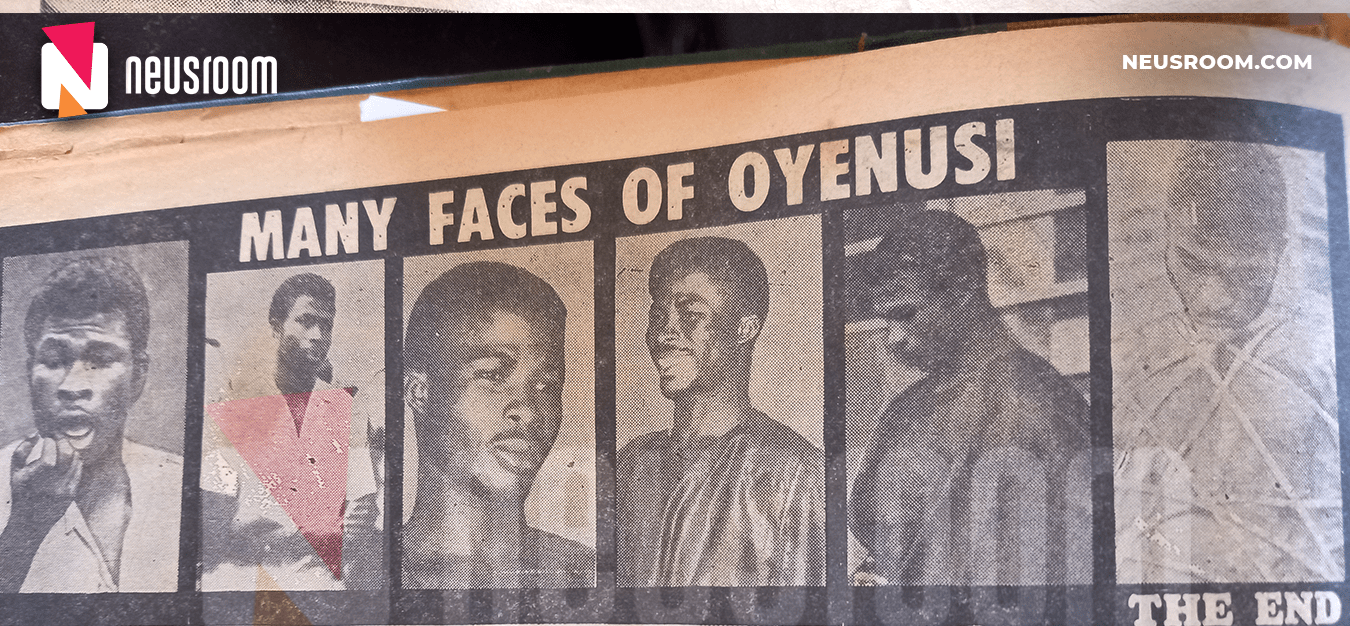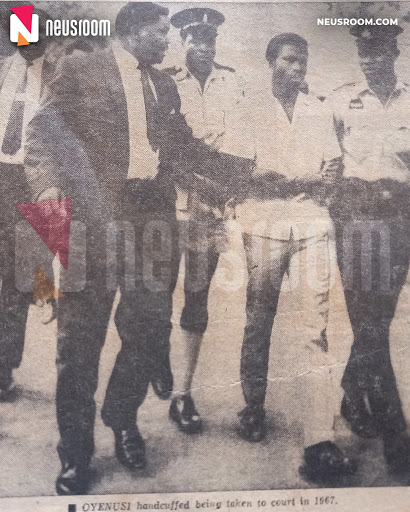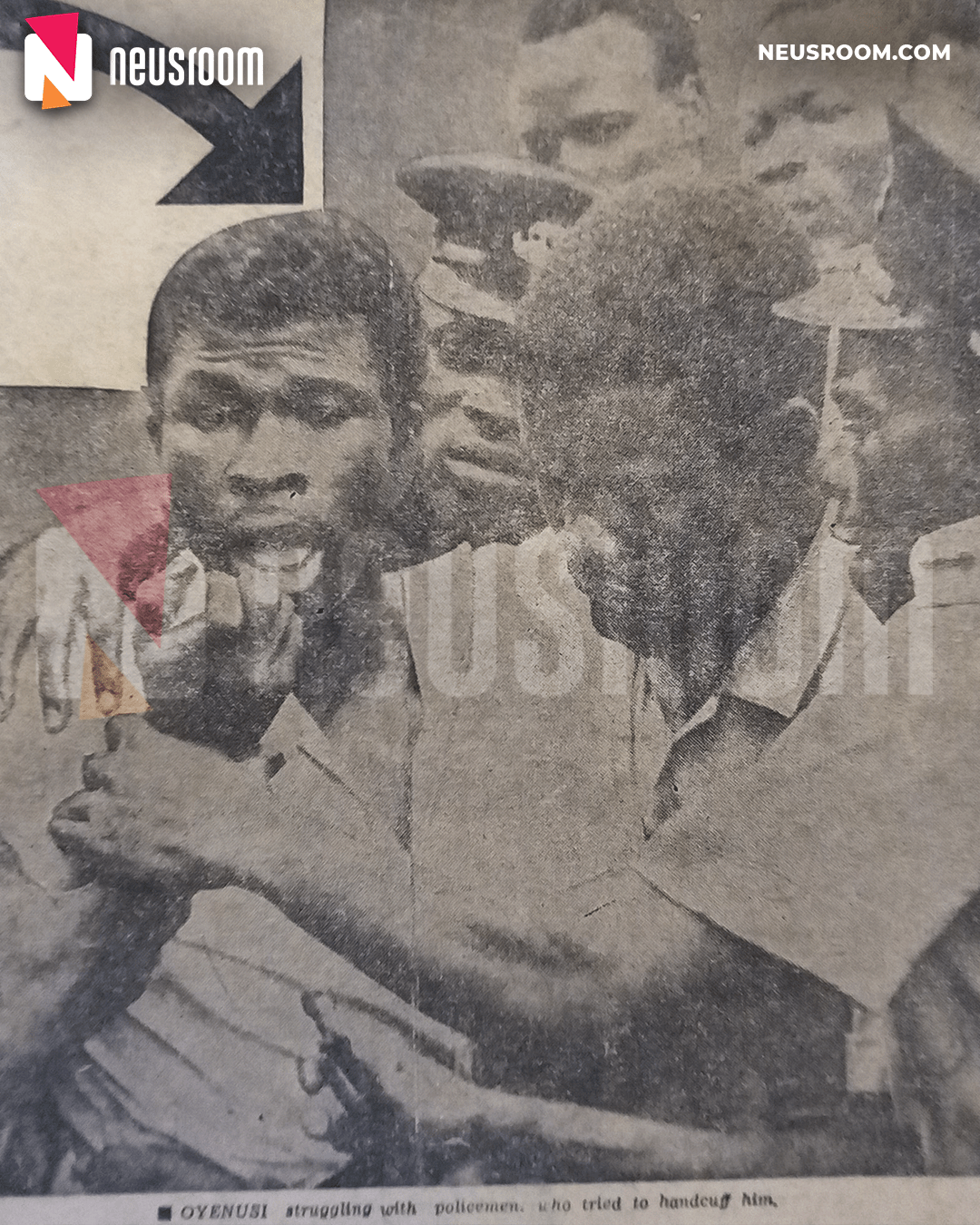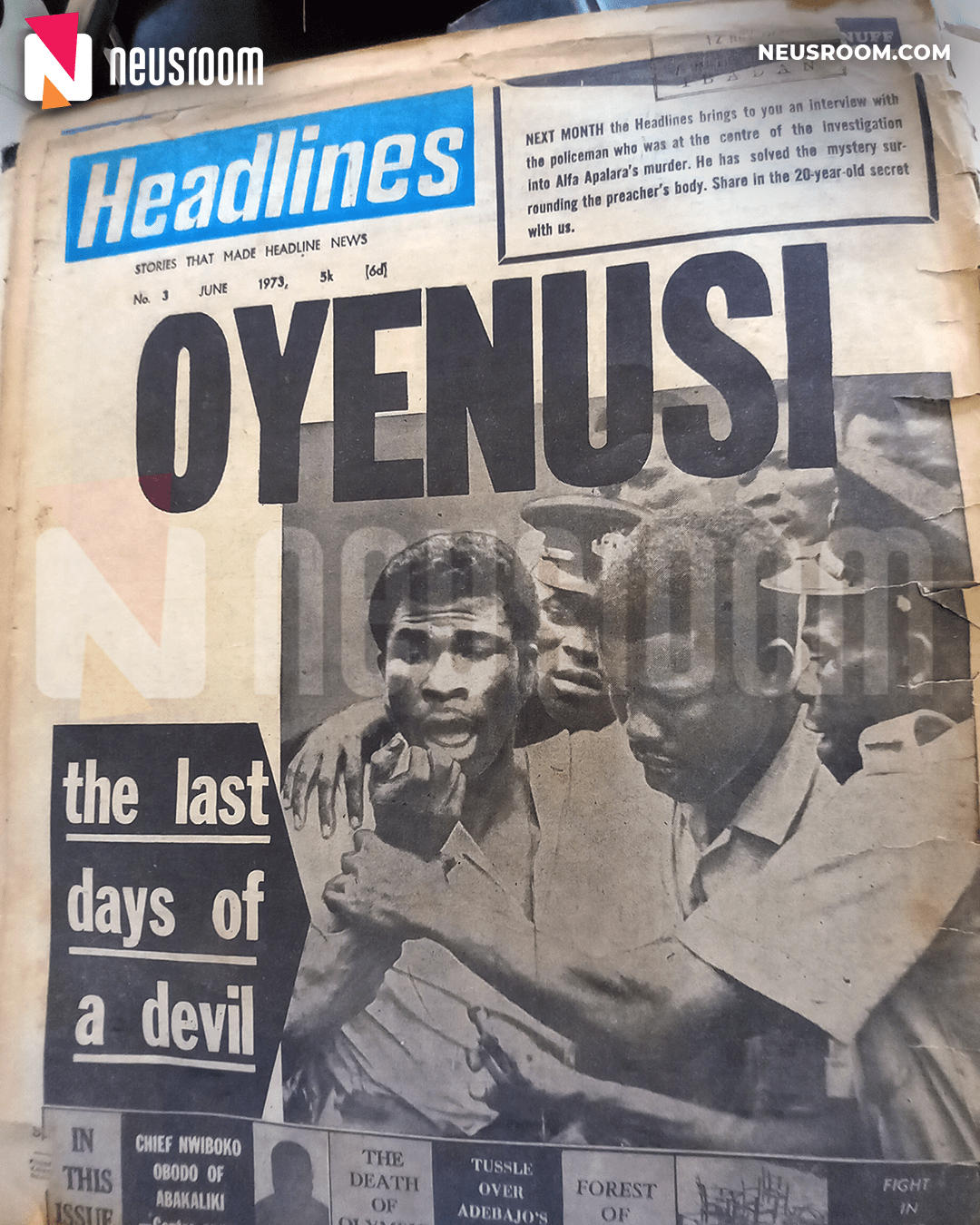Kingpins: The Story of Nigeria’s most Notorious Armed Robbers : Episode 3 – Ishola Oyenusi
The notorious robber who boasted to police he would escape before execution

Ishola Oyenusi: The notorious robber who boasted to police he would escape before execution
Written by Michael Orodare for Neusroom
Additional reporting by Folayan Adejoke
12 April 2021
“Many rich men who ride in cars are thieves,” Ishola Oyenusi told a fellow inmate during one of his jail terms at the Kirikiri prison in Lagos, apparently in an attempt to justify his own crimes.
“They were lucky they were not caught in their attempt to get rich. One of them splashed mud water on me at Ebute-Metta. He did not even say sorry.
For that reason I must ride in my own car,” the Headlines newspaper of June 1973 quoted Oyenusi as saying.
That was the incident that led Oyenusi into robbery and etched his name in Nigeria’s history book as one of the most notorious criminals of all time.
We interviewed the only known living figure among the men who learned robbery from Oyenusi.
We analysed newspaper coverage spanning a decade, and spoke with insiders who helped us navigate the mystery surrounding the man and his crimes. Here’s what we found about how he practiced as a fake doctor, dropped out as a mechanic apprentice with his partner Babatunde Folorunso, how he vowed to get rich by all means; and his many prisons escapes.
The man Oyenusi

‘Dr’ Ishola Oyenusi – a ruthless and notorious robber who
wanted to make money and ride big cars. Photo: Headlines newspaper 1973.
Oyenusi was a vicious armed robber who terrorised Lagos and other states from the late 1960s to the early 1970s. He was comparable only to Lawrence Anini who also led a reign of terror a decade after Oyenusi’s execution.
“He (Oyenusi) was an expert robber and was ruthless and very notorious because that was the first time we experienced a case of armed robbery,” Abubakar Tsav, a former Lagos Commissioner of Police who was an Assistant Superintendent of Police (ASP) in Lagos during the notorious days of Oyenusi told The Punch in March 2020.
‘Dr’ as he was fondly called wanted to make money and ride big cars to avenge the ‘humiliation’ at Ebute-Metta. He was ready to do anything as long as it would bring the kind of life he dreamt of leading.
At 20 he took to armed robbery. It was February 1965, the same year he claimed a car owner splashed mud water on him. Newspaper reports seen at the National Archive, the University of Ibadan by Neusroom, said he had practiced as a fake doctor administering illegal injections on patients. That was the origin of his Dr. prefix.
He also enrolled as an apprentice at a mechanic workshop on Itire road in Surulere, Lagos, where he met Babatunde Folorunsho, the man who would become his partner. Their partnership and thirst for quick wealth led them to abandon the mechanic workshop for a career in armed robbery.
Armed with native charms and different weapons, Oyenusi specialised in carjacking, robbing factories, stores, and waylaying company paymasters on Lagos highways.
When he was first arrested for robbery in 1965, he gave his name as Duro Timothy. On December 16, 1965, the same year he started robbery, he was sentenced to two years in jail by Magistrate Adewale Oshodi for robbing a stationery store at Apapa where his gang stole £1,400.

‘Oyenusi re-arrested in 1967, the same year he completed his two-year jail term.
Photo: National Archive/Headlines newspaper..
After regaining freedom, Oyenusi stepped up his game.
When criminals leave prison, they come out with a vengeance and the determination to unleash more terror on society, Bishop Kayode Williams, one of Oyenusi’s proteges, told Neusroom in an interview on Tuesday, February 23, 2021.
“Prisoners see prison as punishment. Once a prisoner is released, his mind becomes more hardened, and he makes up his mind to punish the people and the society that punished him,” said Williams who was jailed for 10 years for robbery. He now pastors a church in Lagos while championing prison reforms and rehabilitation of ex-prisoners.
Oyenusi returned to town in 1967 and became more fierce, daring, and popular than other members of the gang. He soon became a household name, with his signature on almost every robbery attack in Lagos. This made many believe he was the leader of the gang. “But he was not the leader,” Williams told Neusroom.
“He became popular because of his actions during operations. Balewa, an Indian hemp seller, who also owned a beer parlour at Omitowoju area in Ibadan was like the leader of the group then.”
Although Balewa was not an armed robber, Williams said he knew about the operations. How to get guns and how to get them released from police custody.
“There is no specific leader, there is no way a person will take the lead because they were not coordinated in that form. But when they come, they gather together, plan the operation and get information from the policemen,” Bishop Williams said.
A daredevil robber and serial jailbreaker

Oyenusi protests his sentencing as he struggles with policemen in court. Photo: Headlines newspaper 1973.
In May 1967, Oyenusi and his gang attacked a branch of Standard Bank of West Africa (now First Bank) on Yakubu Gowon Street, Lagos, where they looted 14,000 pounds. Three months later, he was arrested after attacking the cashier of CFAO, an auto company. He was tried before Magistrate Oshodi, again.
According to newspaper reports from archives seen by Neusroom at the National Archive, University of Ibadan, the following conversation ensued between the judge and the criminal:
The magistrate recognised him and asked for his name. “Dr” Ishola Oyenusi,” he replied.
Magistrate: “Weren’t you the man I jailed for two years at Apapa for armed robbery?”
Oyenusi: “Your worship… (silence)”
After sentencing him to 10 years in jail, the angry Magistrate told Oyenusi, “You’re very lucky that I have limited power, if not, I would have sent you for a long term of imprisonment.”
While serving this term, Oyenusi escaped from jail in Lagos to lead a robbery operation in Maiduguri, Borno State.
The popular perception at that time was that Oyenusi was invincible and possessed some mystical powers that could make him appear anywhere his name was mentioned. This created fears in the mind of the populace, and security operatives avoided talking about him.
“Some policemen were afraid of him. Many of them were scared of mentioning his name,” Tsav said. “They thought he could suddenly appear in their midst with the mention of his name.”
On November 31, 1967, Oyenusi and three gang members were sentenced to 25 years in jail by Magistrate Victor Adedolapo Ilori after police escorts and soldiers at Ikeja military barracks foiled their attack on Eraido Noca, the paymaster of Cappa D’Alberto Company around Onigbongbo area of Ikeja.
“You’re no doubt a menace to society and the people. I hope you will let us rest by this sentence,” the Magistrate told Oyenusi.
The 22-year-old put up a drama in court after the judgement: “I am not leaving the court, I am prepared to die here,” he said before he was forced out of the dock by police and warders and whisked away to prison.
The sentence failed to clip Oyenusi, instead, he became more notorious.
Again, he escaped from Kirikiri prison in Lagos with Babatunde Folorunso who was also serving 16 years jail term.
On April 24, 1968, his attempt to snatch a car from a military officer on Aborishade street in Surulere, Lagos, failed after the officer shot him on his left thigh.
He was arrested and in court, he told the judge: “I didn’t know that I committed any crime until I found myself in the hospital. I drank myself stupid because it was the night of my birthday.”
The Magistrate wished him a happy birthday and sentenced him to 10 years in jail for attempted robbery and escape from lawful custody. Oyenusi and Folorunso were transferred to Jos Prison where they escaped again and made their way back to Lagos to unleash more terror.
The WAHUM robbery that nailed Oyenusi
After escaping from prison repeatedly, the law finally caught up with Oyenusi in 1971 after his last operation at West Africa Household Utilities Manufacturing Company (Nig.) Limited (WAHUM) in Ikeja, Lagos on March 27, 1971. His gang stole N200,000 meant for workers’ salary.
Investigations into the robbery led to his arrest on May 7, 1971, in Ibadan where he owned a beer parlour and a building materials shop.
By the time he was arrested in 1971, the judicial system had witnessed a drastic change with the introduction of the Robbery and Firearms Decree of 1970 by the military regime of Yakubu Gowon. The decree stipulated a death sentence for convicted robbers. His trial before the Military tribunal started August 11 and ended August 26, 1971, when Oyenusi and six others were sentenced to death by firing squad.
On September 8, 1971, the day Oyenusi and his gang were executed, thousands gathered at the Lagos bar beach to witness the end of the man whose name and presence meant terror.
Up to the point of his execution, Oyenusi was confident it was not the end of the road for him.
“When he was arrested, he kept on boasting that he would escape and that was why he was kept under a strict security watch,” Tsav said. “He believed he had mystical powers that could make him disappear, and that if we shot him, the bullet would not penetrate.”

The front page of a June 1973 edition of Headlines newspaper seen at the National Archive.
But the charms failed him. It was a sad end for Oyenusi, but the beginning of relief for Nigerians and an end to another phase of terror.
“Oyenusi smiles to his death,” read the lead story on the front page of Daily Times newspaper the morning after his execution.
Despite his public execution alongside other members of his gang, the fear of Oyenusi did not clear off easily. It was so prevalent at that time that in 1977, six years after his death, no actor was willing to play his role in a movie by the veteran movie director, Eddie Ugbomah, titled “The Rise and Fall of Dr. Oyenusi”.
“Everyone feared retribution from the “Dr’s” gang, so the director played the role (of Oyenusi) himself,” Frank Ukadike wrote in his book ‘Black African Cinema’.
Thirty-seven years later, Nollywood actor, Odunlade Adekola, made another attempt at playing Oyenusi’s role. ‘Oyenusi’ was released in 2014 to tell the story of the life and crimes of the dreaded armed robber. The movie was a huge success but Oyenusi lived a far more ruthless life than Nollywood could ever depict.


Excellent really enjoyed reading
I been following the record of this notorious army robber for long but there is no any news papers bring you how ishola was arrested, they only told you he was arrested in ibadan, thank you very good job, looking forward for another question for you,